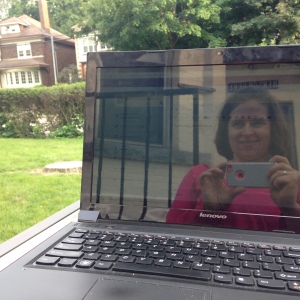So, last week, I told you about my latest and not so greatest CrossFit news…the less than wonderful world of injury (I still shudder when I use that word to describe myself).
Happily, although still not 100% better, and I’m still trying to be really careful and avoiding certain movements, things are (*I think*) improving.
As I sit and reflect on the past weeks, I can’t but feel grateful (although blogging “a l fresco” on a beautiful summer night (see photo) certainly doesn’t hurt feelings of gratitude either :)).
l fresco” on a beautiful summer night (see photo) certainly doesn’t hurt feelings of gratitude either :)).
It might sound crazy, but at the end of this week, despite all the challenges I’ve faced lately, and the fact that my training has somewhat of a different focus than I thought it would for summer, I am filled with gratitude.
Injuries and setbacks, whether they are physical or otherwise, can be blessings in disguise. They force us to sit back, shift our perspective, and see things in a different light.
So what is there to be grateful for….?
1. That, until recently, and, for the most part, I live my life pain-free and able to do whatever exercise I want. This is something that I think those of us in good health truly take for granted. I said to another friend at the gym who’s been struggling with a back injury, I don’t know how people who live in chronic pain do it! I can’t even imagine…
2. That I have found a sport and community that I truly love. I already knew this, but after being out of the gym for a few days completely and then cutting back on my time there for a week, I realized just how much that my CrossFit community means to me. Not only did I miss my friends, but when the times I was at the gym, there was always someone asking how I was doing.
3. That I go to a gym with great coaches who care about form and quality of movement. I mentioned last week that since my back has been acting up, Coach Duncan has really been on me about form. And I wouldn’t have it any other way. I don’t want to push through a workout with poor form just to RX it. I don’t want to keep lifting heavier weights if I’m not doing it safely. I want coaches who will call me out if they see me doing something improperly or unsafely, and thankfully, I’ve got them.
4. That, on top of great coaches, I also have two great healthcare professionals working alongside my coach to not only help my back get better, but to help me move better to improve posture and prevent future injuries.
Let’s use today as an example of just HOW awesome this team is and how lucky I am to have them. 6 AM WOD, we do Cindy and I am laser-focused on form, under Coach Duncan’s supervision. After class, chat with Mandy, the massage therapist I see who also personal trains at our gym. She says my squats are looking way better (and they should be with the amount of mobility I’ve been doing the past week, I might add). I ask if she’s chatted with Lisa (the chiropractor at the same clinic who I see, who is also a gym member). Lisa saw my posture on Wednesday at the gym for the first time (we don’t usually work out at the same time) and had some new insights (hello hyper-extended knees, my lifelong habit). Mandy texts Lisa and asks her to call her before I see her at 11:30.
11:25 I get to my appointment early. Turns out Duncan had an appointment right before me. Lisa is between appointments, and him, Mandy, and her are chatting about me (all good things I’m told) and how they can help me move better.
11:30 Mandy works on weaknesses to help support my posture (who knew the back of your knees could be so painful?!?!?) and gives me a boatload of mobility work to do (on top of my mobility homework and postural check-ins that Duncan has me working on).
Aside from professional athletes, I really don’t think there are many average gym-goers that have such an awesome team working together to support health, posture, mobility, and better integrity and quality of movement. Am I right?
5. That I have a job with benefits that pay for the above-mentioned healthcare professionals. Thankfully, I can get coverage for both massage and chiropractic, which is AMAZING and makes it much easier to see “my team” more often.
6. That this injury has help expose longstanding postural and movement issues. As previously mentioned, I have always hyperextended my knees when I stand (not sure why). It’s one of those things I’ve always known wasn’t good, but I am just so used to it, I keep doing it. Now I’ve got hourly “postural check-ins” assigned as homework to help correct that, and other faults (my mom is sighing with gratitude right now after a lifetime of telling me to stop “boinging my knees”). Fixing my posture will pay off both in and outside of the gym, and my back will be healthier for it I know.
7. Snatching!!! I went to Olympic lifting class today (I can’t go during the school year due to my teaching schedule) and snatched for the first time in month. I didn’t do anything crazy, but it felt *so good* to get under weight again. I’m still being careful, but a bit of time off made me realize how much I love my Oly lifting.
8. That I am surrounded by people who care about me and will give it to me straight. There’s the gym friends who told me to be careful and asked how my back was doing. Of course, there’s family who don’t want to see me injured. There’s my CrossFit friend Soph who knows how hard and how much I like to work and push myself, and helped me see that taking rest was ok, and important. And I knew that when I asked Coach Duncan straight up if it was ok for me to go ahead with the team competition I’m doing in a week (I got the go-ahead – yay!), he would give me an honest answer and wouldn’t let me do it if I was going to get hurt. I wouldn’t trade any of these guys for the world!
So, whether you are injured or not, or even if you’re just not where you’d hoped you’d find yourself, or progress is stalling, take a step back. Stop and look around you. I’m betting you’ll find you’ve got a lot to be grateful for too.
Stay tuned…lots of exciting things to blog about in the weeks to come: vacation WODs (going to a resort with my family next week), re-cap of upcoming competition (it’s outside! on the beach!), the long-awaited part 3 of my nutrition series, and of course, updates on how my back is doing and what I’m dubbing the #summerofmobility. Oh, and in case you forgot, JESS IS HAVING TWINS SOON!

